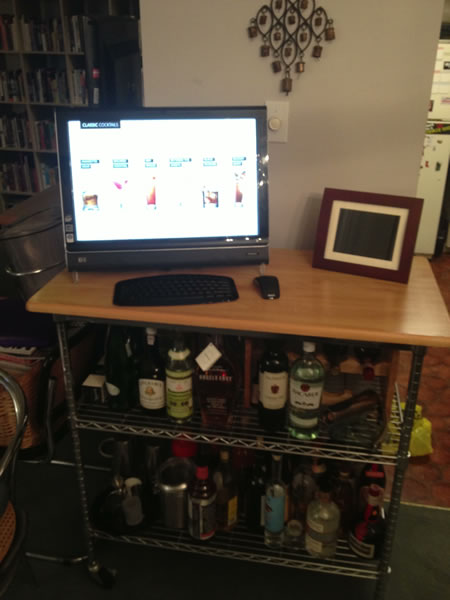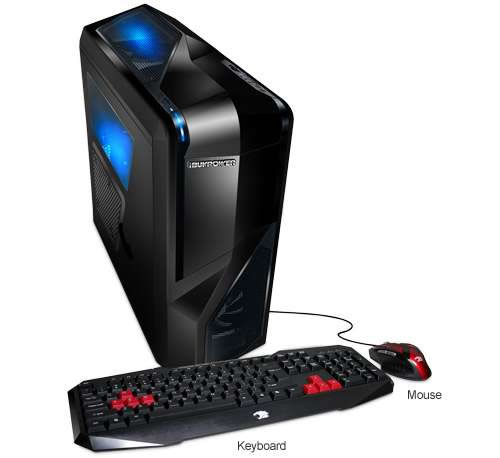The Story Makes the Rounds
My experiment with Bitcoin mining seems to have made the rounds: FARK, Boing Boing and TechCrunch have pointed to my original article as well as the follow-up in which I wrote that I was making more money writing about mining Bitcoins than actually mining them. If you read the comments for both articles, you’ll see that a few people were upset by what I wrote, saying that I “hadn’t done proper research”, which might more correctly be put as “I didn’t use their setup”.

The article was meant for a beginner audience interested in Bitcoin mining. “How do I do it, and how much can I make?”, a few non-techie friends asked. So I performed the experiment on a spare machine that they were likely to have at home — perhaps a machine that’s since been replace by a more current one, or a cast-off from a friend or relative (I myself prefer to give my old computers to friends in need rather than selling them). I picked the HP IQ526 Touchsmart as my mining machine for a couple of reasons:
- It’s probably representative of the sort of machine most non-technical people might have lying idle in their house.
- Aside from being a cooking and drinks recipe machine (it’s on my bar, and right by the kitchen), it’s the one computer in the house that isn’t really being used for much.
So fret not, Bitcoiners, I’m not trying to malign what you’re doing; I’m just trying to show some non-techies how to get started, and what to expect with the gear they’re most likely to have available.
I’ve Got a Little Mad Money. What if I Got a Gaming Rig?
Consider this rig, the iBuyPower TG930SLC Gaming PC, which you can get online for US$900 at Tiger Direct. It’s one of the “budget” machines:
Remember, Bitcoin mining is mathematically intensive, and best relegated to the processing unit on the graphics card rather than the central processor. So we’ll ignore the CPU (central processing unit, the “main brain” of the computer) specs, as the GPU (graphics processing unit) will be doing the heavy lifting as far as mining is concerned. This machine features an nVidia GeForce GTX 600-series GPU, which according to this chart, should mine at a rate of somewhere between 110 – 130 MHash/s (megahashes per second). My machine mines 0.0001 BTC a day under current conditions; this machine, performing at 100 times the speed of mine, should be able to mine 0.01 BTC a day, or 1 BTC every hundred days, or 3.7 BTC every year. At the current Bitcoin exchange rate of 1 BTC = US$124 (which you can always check at Mt. Gox), that’s US$1.24 a day, just shy of $9 a week, a shade more than $37 a week, and a bit over $450 a year.
According to Bitclockers’ mining calculator, the graphics card that gives you the best bang for the buck is the AMD (a.k.a. ATI) Radeon HD 5870 if you buy it on eBay at the average price of US$140. It can mine at the rate of a miner- and stoner-friendly rate of 420 MHash/s, which should work out to 0.042 BTC a day, or 1 BTC about every 24 days, under current conditions. That works out to US$5.20 a day ($1900 a year) at the current exchange rate. Not bad.
The fastest card listed on Bitclockers’ mining calculator chart is the AMD Radeon HD 6990 — on the chart, it retails for US$950, but sells on eBay for about $500. At 700 MHash/s, you should be able to mine 0.07 BTC a day ($8.68 at the current rate), or 1 BTC every fortnight, under current conditions.
Note that I keep describing the return “under current conditions”. Bitcoin is a system that adjusts itself so that blocks are produced at a consistent rate, no matter the collective horsepower of all the machines doing the mining. This adjustment is made by changing a factor called the difficulty, which affects the difficulty of the number-crunching involved in mining. Barring malfunction, any machine will mine at the same rate, but the difficulty will always increase. The same mining rate, over time, will produce a an ever-smaller amount of Bitcoin.
If you’re serious about Bitcoin mining, I’d advise against getting a gaming rig or another graphics card for your computer. GPUs, for the purposes of Bitcoin mining, are nearing the end of their era of usefulness, as a new processor technology is coming on the scene.
Hardcore Mining on a Budget
If you really want to do hardcore mining on as little money as possible, you might want a spicy little device called the Jalapeno. Check out David Perry’s video showing this little beast in action:
Produced by Butterfly Labs, it’s powered by an ASIC — an Application-Specific Integrated Circuit — which means that its processor was custom-built for a singular purpose: performing the calculations that mine Bitcoins. At US$250 (plus $50 for shipping), it mines at a rate better measured in gigahashes rather than megahashes. It’s rated at 5 GHash/s, and in the video above, it’s surpassing that, clocking along at just over 5.5 GHash/s. At that rate, it should — under current conditions, of course — mine at about 0.55 BTC a day, far outstripping the performance of even the fastest graphics card. If you want to get started Bitcoin mining now, the Jalapeno gives you the baseline performance you should expect, and at a nice price.
You have to remember: this is Butterfly Labs’ budget model. Take a look at their catalog:
Click to see the catalog.
They’ve got machines mining at 25, 50 and even 1500 GHash/s. These machines are only entering production now, and if you can somehow get one early, you should do quite well.
Keep in mind that Bitcoin is a self-adjusting system and as machines with this level of mining power become more common, the difficulty will automatically adjust to keep the rate of production steady. Fast gaming machines, and eventually even the Jalapeno, will eventually mine as much Bitcoin as my sad machine does now.
I’ll have to admit, that at $300 with shipping, I’m tempted to place an order for the Jalapeno. The problem is that it was available for pre-order a good while back, and production is just starting now. As a result, there’s a waiting list, and I have no idea how long that list is. Remember, having one sooner is better: the more of these things that are in use, the worse their returns will be.
For more about ASIC-based Bitcoin miners, see this Wired article: Inside the Race to Build the World’s Fastest Bitcoin Miner, which covers the companies making them, and the difficulties they’ve encountered pushing the bleeding edge.
Should You Mine Bitcoins?
My answer is “only if you’re serious about it”. Bitcoin mining is both an arms race and a zero-sum game: in order for you to do better, you will need to regularly upgrade your hardware, and some combination of everyone else has to do worse. The system is designed to adjust for changes in the size of the competitive field and evolving technology, which means that today’s excellent mining machine is tomorrow’s junk. If you’ve got the money and can manage the arms race and take advantage of situations which let you access better mining hardware sooner than others, and you have a firm belief that Bitcoin’s will become a viable currency, then by all means, go for it!


2 replies on “My Bitcoin Mining Advice”
So are we saying – the low end Jalapeno…
Amount BTC: 0.55
Current rate per BTC as of 4/24/2013 = $131.65 usd
BTC: 0.55 Equals $72.41 per day multiplied by 365 day year
Equals $26,429.65 ??
The two big factors that will affect what you make are:
To a lesser extent, your electricity costs will also affect what you make. The Bitcoin algorithm is designed to make it so that mining coins requires a fair bit of power.
And finally, there’s the matter of whether Butterfly worked out the kinks in their ASIC chips. Their first batch ran so hot that they melted, which delayed the release of the Jalapeno until now.
Try out this Bitcoin calculator, which will give you a more accurate figure of how much you stand to make with a Jalapeno.